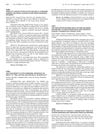 8 citations,
July 2019 in “Endocrine connections”
8 citations,
July 2019 in “Endocrine connections” Finasteride affects SRD5A2 gene pattern, possibly causing lasting side effects.
 68 citations,
March 1965 in “The BMJ”
68 citations,
March 1965 in “The BMJ” Hormones and genetics affect hair growth and patterns, with some changes reversible and others not.
[object Object]  5 citations,
May 2019 in “Hormone and Metabolic Research”
5 citations,
May 2019 in “Hormone and Metabolic Research” Women with nonclassic 21-hydroxylase deficiency can have successful pregnancies through IVF, with certain factors affecting their chances.
 40 citations,
November 1998 in “The journal of investigative dermatology/Journal of investigative dermatology”
40 citations,
November 1998 in “The journal of investigative dermatology/Journal of investigative dermatology” S100A3 protein is crucial for hair shaft formation in mice.
4 citations,
March 2022 in “Pharmaceutics” Regenerative cellular therapies show promise for treating non-scarring hair loss but need more research.
103 citations,
December 2021 in “Journal of biological rhythms” Shift work disrupts the body's natural clock, leading to health problems.
25 citations,
September 2005 in “Journal of the American Academy of Dermatology” Rapp-Hodgkin syndrome, AEC, and EEC are different expressions of the same genetic disorder caused by TP63 gene mutations.
2 citations,
August 2022 in “Middle East Fertility Society Journal” The new rodent model successfully mimics non-lean human PCOS symptoms.
 30 citations,
January 2023 in “EFSA journal”
30 citations,
January 2023 in “EFSA journal” Adults should not consume more than 255 micrograms of selenium per day to avoid risk of hair loss and other side effects.
 February 2024 in “Brain research bulletin”
February 2024 in “Brain research bulletin” Blocking androgen activity in newborn rats affects body weight and appetite-related hormones differently in males and females.
 1 citations,
January 2015 in “Journal of nutrition & health”
1 citations,
January 2015 in “Journal of nutrition & health” Fish oil improves skin health in people with diabetes and high cholesterol.
 98 citations,
June 2008 in “Human mutation”
98 citations,
June 2008 in “Human mutation” A genetic change in the EDAR gene causes the unique hair traits found in East Asians.
 8 citations,
December 2011 in “Journal of Medicinal Food”
8 citations,
December 2011 in “Journal of Medicinal Food” D-004 may be a natural alternative to finasteride for treating enlarged prostate and male baldness.
[object Object] 11 citations,
January 2010 in “Springer eBooks”  158 citations,
May 1968 in “The journal of nutrition/The Journal of nutrition”
158 citations,
May 1968 in “The journal of nutrition/The Journal of nutrition” Zinc is crucial for growth and health in rats.
 2 citations,
October 2022 in “Frontiers in genetics”
2 citations,
October 2022 in “Frontiers in genetics” Late diagnosis of congenital adrenal hyperplasia can greatly affect physical development, gender identity, and sexual health.
 40 citations,
March 2016 in “The Journal of Clinical Endocrinology & Metabolism”
40 citations,
March 2016 in “The Journal of Clinical Endocrinology & Metabolism” Young girls whose mothers have PCOS may have higher activity of a specific enzyme that could lead to developing PCOS later.
9 citations,
August 2021 in “Journal of clinical medicine” Pili torti is a rare condition where hair is twisted and breaks easily, often linked to genetic disorders or other health issues.
 7 citations,
September 2013 in “Current Dermatology Reports”
7 citations,
September 2013 in “Current Dermatology Reports” Some skin medications are safe for pregnant women, but others pose risks or should not be used.
 3 citations,
July 2018 in “Biomedicine & pharmacotherapy”
3 citations,
July 2018 in “Biomedicine & pharmacotherapy” Paeoniflorin protects brain cells by involving a specific protein and neurosteroids.
 86 citations,
August 2011 in “Toxicological sciences”
86 citations,
August 2011 in “Toxicological sciences” TCDD speeds up skin barrier formation by increasing certain gene expressions.
 119 citations,
January 2012 in “Nutrition & Metabolism”
119 citations,
January 2012 in “Nutrition & Metabolism” Modern lifestyles, including poor diet, stress, and long-term use of certain medications, hinder the body's ability to heal from inflammation, leading to chronic diseases.
 11 citations,
January 2016 in “The Journal of Sexual Medicine”
11 citations,
January 2016 in “The Journal of Sexual Medicine” Young women with nonclassic congenital adrenal hyperplasia may experience worse sexual function and mild depression compared to healthy women.
317 citations,
April 2018 in “Journal of steroid biochemistry and molecular biology/The Journal of steroid biochemistry and molecular biology” PCOS is a complex condition in women that can lead to health issues, and lifestyle changes are the best management approach.
 3 citations,
November 2015 in “Endocrinology, Diabetes & Metabolism Case Reports”
3 citations,
November 2015 in “Endocrinology, Diabetes & Metabolism Case Reports” Ring Chromosome 11 may be linked to conditions like early puberty, excessive hair growth, hair loss, and type 2 diabetes.
 January 1995 in “Adolescent and pediatric gynecology”
January 1995 in “Adolescent and pediatric gynecology” Mutations in the androgen receptor gene cause different levels of androgen insensitivity, making it hard to create simple tests for the condition.
 37 citations,
February 2013 in “Maturitas”
37 citations,
February 2013 in “Maturitas” Testosterone therapy is beneficial for women's health and does not cause masculinization or liver damage, and it protects the heart and breasts.
 14 citations,
January 2013 in “Indian Journal of Endocrinology and Metabolism”
14 citations,
January 2013 in “Indian Journal of Endocrinology and Metabolism” Women with congenital adrenal hyperplasia have lower fertility, but with proper treatment, they can conceive successfully.
 19 citations,
March 1998 in “Endocrinology”
19 citations,
March 1998 in “Endocrinology” Male rats have more somatostatin neurons than females due to testosterone converting to estrogen during early development.
 April 2012 in “The Journal of Urology”
April 2012 in “The Journal of Urology” Male pattern baldness may predict prostate cancer risk.























